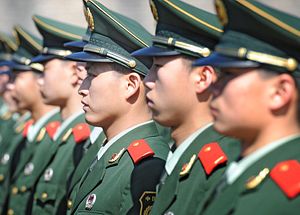Lieutenant General Wang Ning, newly appointed commander of the People’s Armed Police of the People’s Republic of China, and Lieutenant General Miao Hua, newly appointed political commissar of the PLA Navy, have at least two things in common.
First, in contrast to their immediate predecessors, they lack prior experience in their current jobs. General Wang Jianping, Wang Ning’s predecessor, had worked in the People’s Armed Police for almost two decades. He had been deputy chief of staff, chief of staff, and deputy commander before his appointment as commander of the People’s Armed Police in December 2009. Wang Ning, however, had worked all of his military career in the army until his appointment as the armed police chief.
General Liu Xiaojiang, Miao Hua’s predecessor, had worked in the PLA Navy for more than two decades. He began his career in the PLA Navy as secretary of General Liu Huaqing in 1980 but later was transferred to the General Political Department. He came back to the PLA Navy as deputy director of the Political Department in 1998 and was appointed political commissar of the PLA Navy 10 years later. Miao Hua, on the other hand, had never worked in the PLA Navy until December 2014 when he was appointed its political commissar.
Second, both Wang Ning and Miao Hua have worked in the 31st Army before. Wang Ning was commander of the 31st Army from November 2007 to December 2010, and Miao Hua spent 36 years in the 31st Army, including a stint of six years as director of its Political Department.
One may also find other generals from the 31st Army among the leadership of the PLA. Those include General Zhao Keshi, a member of the Central Military Commission and director of the General Logistics Department; General Wu Changde, deputy director of the General Political Department; and General Cai Yingting, commander of the Nanjing Military Region. It is probably by coincidence that the 31st Army is stationed in Fujian Province where Chairman Xi Jinping of the Central Military Commission worked for 17.5 years.
Predictably, both Wang Ning and Miao Hua will be awarded the rank of general in the near future and enter the Central Committee of the Chinese Communist Party as full members at the 19th Party Congress in 2017.
Professor BO Zhiyue, a leading authority on Chinese elite politics in the world, will take up an appointment in January 2015 as Director of the New Zealand Contemporary China Research Centre (NZCCRC) and Professor of Political Science at Victoria University of Wellington. The only nation-wide research center on contemporary China in the world, NZCCRC aims to be a global leader in knowledge generation and knowledge sharing on political, economic, and social life of contemporary China among tertiary institutions, business sector, and policy community for the benefit of New Zealand. Based in Victoria University of Wellington, the Centre has seven member universities: Victoria University of Wellington, the University of Auckland, Auckland University of Technology, the University of Canterbury, the University of Otago, the University of Waikato, and Lincoln University.

































